
"California Love" is a song by American rapper 2Pac featuring fellow American rapper-producer Dr. Dre and American singer Roger Troutman. The song was released as 2Pac's comeback single after his release from prison in 1995 and was his first single as the newest artist of Death Row Records. The original version is featured on the UK version of his fourth album, All Eyez on Me (1996), and is one of 2Pac's most widely known and most successful singles. It reached number one on the Billboard Hot 100 for two weeks and also topped the charts of Italy, New Zealand, and Sweden. The song was posthumously nominated Grammy Award for Best Rap Performance by a Duo or Group in 1997.

"Don't Stop Movin'" is a song by Italian electronic music group Livin' Joy. It is the follow-up release to their previous single, "Dreamer", which was a number-one hit in the UK. The song was released on their only album, Don't Stop Movin (1996). Along with the rest of the album, the song featured vocals by Tameko Star who also has a writing credit. "Don't Stop Movin" peaked at number one in Italy and number 12 on the Eurochart Hot 100. In the UK, the single had was released on 3 June 1996 and peaked number five on the UK Singles Chart, where it spent seven weeks in the top 10 and a 14 weeks in the top 100. It ended the year as the UK's 34th-biggest-selling single of 1996.
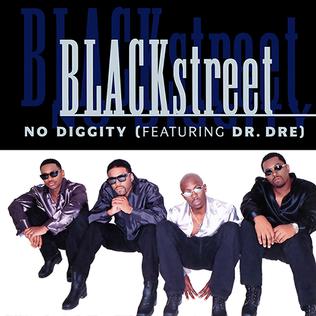
"No Diggity" is a song by American R&B group Blackstreet as the first single for their second studio album, Another Level (1996), featuring Dr. Dre and Queen Pen. Released on July 29, 1996, the song reached number one on the US Billboard Hot 100 and in Iceland and New Zealand. "No Diggity" ended "Macarena"'s 14-week reign atop the Billboard Hot 100. In the United Kingdom, the song peaked at number nine. "No Diggity" was the final number-one single of Cash Box magazine. The track sold 1.6 million copies in 1996 and won the 1998 Grammy Award for Best R&B Performance by a Duo or Group with Vocals. It uses samples from Bill Withers's "Grandma's Hands".

"Insomnia" is a song by British musical group Faithless. Released as the band's second single, it became one of their most successful. It was originally released in 1995 and reached number 27 on the UK Singles Chart, topping the UK Dance Chart in the process. When re-released in October 1996, the song achieved a new peak of number three in the United Kingdom and topped the charts of Finland, Norway, and Switzerland, as well as the American and Canadian dance charts. It also featured on Faithless's 1996 debut album, Reverence.
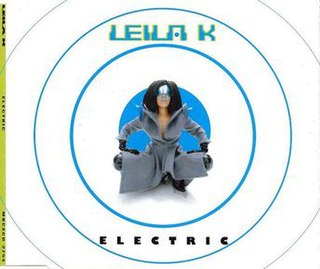
"Electric" is a song recorded by Swedish artist Leila K. It is produced by Denniz Pop and Max Martin, and released as a single in late 1995. In 1996, it was included on her third album, Manic Panic. The chorus is sung by Swedish singer Jessica Folcker. The single peaked at number 2 in Finland, number 8 in Sweden and number 37 in Belgium. On the Eurochart Hot 100, it reached number 86. Outside Europe, it was a Top 20 hit in Israel, peaking at number 18.

"Seven Days and One Week" is a song by Italian-French electronic music act B.B.E. It was released in July 1996 as the lead single from their debut album, Games (1996). As a representative of the short-lived dream house sound, the song became a top 10 hit worldwide, most notably reaching number-one in Spain, number two in Belgium, Finland, Ireland and Italy, and number three in Germany, the Netherlands and the United Kingdom. On the Eurochart Hot 100, it also peaked at number three.

"It's My Life" is a song by Nigerian-Swedish recording artist Dr. Alban. It was released in February 1992 in Sweden as the first single from his second studio album, One Love (1992). Produced by Denniz PoP, who also co-wrote the song, it was a hit in most of the European countries where it was released, peaking at number one in Sweden, Austria, Germany, Italy, the Netherlands and Belgium and number two in the UK. In France, the song was marketed twice: first in 1992, then in 1993 because the song was used in a TV advert for Tampax tampons, thus giving to the single a second career. The song had enough airplay on US college radio stations to chart on the Billboard Modern Rock Tracks in 1992. "It's My Life" was re-released in 1994 in Australia, following the success of "Sing Hallelujah!".
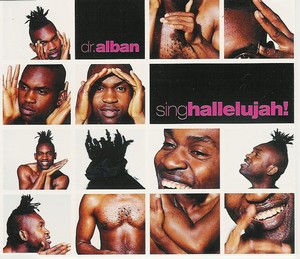
"Sing Hallelujah!" is a song recorded by Sweden-based musician and producer Dr. Alban. It was released in 1993 as the third single from his second studio album, One Love (1992). Been described as an "discothèques anthem with dance and disco sonorities", the song became a hit in many European countries, managing to reach to the top 5 in Belgium, Denmark, Finland, Germany, Iceland and Switzerland. In the UK, it peaked at number 16 on the UK Singles Chart, while on the Eurochart Hot 100, it peaked at number four. Outside Europe, in Australia, "Sing Hallelujah!" peaked at number five and in Zimbabwe, it reached number 11. After "It's My Life", this was the second Dr Alban's hit which had an international scope. Its accompanying music video also received heavy rotation on MTV Europe. In 2005, "Sing Hallelujah!" charted again when it was re-recorded by the artist in new versions, peaking at number 12 in Finland.

"Look Who's Talking!" is a song by Sweden-based musician and producer Dr. Alban, featuring vocals from Swedish singer Nana Hedin. It was released in February 1994 as the first single from his third studio album, Look Who's Talking (1994). Co-written by Alban with Denniz PoP, the song was co-produced by Kristian Lundin and reached number-one in Denmark and Finland. It became a top-10 in almost all other European countries, except France and the UK. The song entered the Eurochart Hot 100 on 12 March 1994 at number 61 and went on to peak at the second position four weeks later. In the US, it peaked at number 11 on Billboard's Hot Dance Club Play chart. Its music video was directed by Jonathan Bate. A CD maxi containing four remixes was also released, particularly devoted to the dance floors.

"One Love" is a song recorded by the Sweden based musician and producer Dr Alban. It was the second single from his second studio album, One Love (1992). Alban co-wrote it with Denniz PoP, who also produced it. Released in August 1992, the song was a hit in many European countries. It made it to the top-10 in Austria, Belgium, Finland, Germany, Ireland and Norway; however, the song was not as successful as "It's My Life", the previous single. On the Eurochart Hot 100, "One Love" peaked at number 23. Outside Europe, it was successful in Israel, reaching number five.
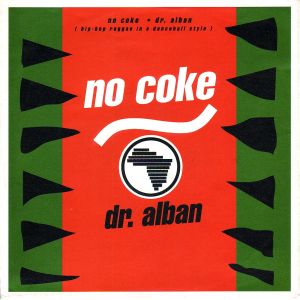
"No Coke" is a song recorded by Sweden-based musician and producer Dr Alban. It was originally released as the B-side of the 12" version of his debut single "Hello Afrika" and became the second single off his debut album, Hello Afrika (1990). Released in November 1990, the song was a hit in several European countries and reached number-one in Sweden. To date, it is one of Dr Alban's most successful songs, along with "It's My Life" and "Sing Hallelujah". It was produced by Denniz Pop, who recorded the song's signature bassline using a Roland Juno-106 synthesizer. The song is performed in English and the lyrics describe a tragic event outside Alban's nightclub Alphabet Street in Stockholm. In November 2017, it was the topic at SVT:s Hitlåtens historia.
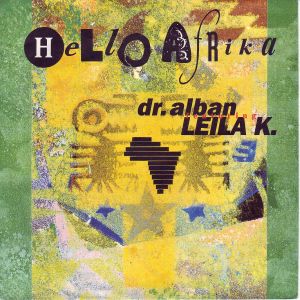
"Hello Afrika" is a 1990 song recorded by Sweden-based musician and producer Dr Alban. It was released as the debut single from his first album with the same name (1990). It features Swedish Eurodance singer Leila K. The song is similar to Eddy Grant's "Hello Africa", but in the style of hip hop. It peaked at number one in Austria and achieved a great success in most of the other European countries, including Sweden, Germany and Switzerland.
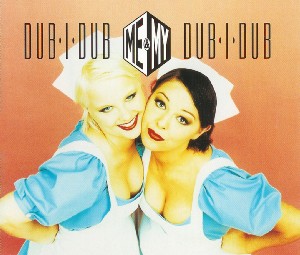
"Dub-I-Dub" is a song by Danish Eurodance act and sisters Me & My, released in September 1995 as the first single from their eponymous album (1995). It was successful on the charts in many countries, peaking at number-one in Denmark and Japan, and being a top 10 hit in Belgium, Hungary, Iceland, Israel, Italy, Mexico, Russia, Spain and Sweden.

"I'm Alive" is the debut single by London-based DJ/producers Stretch Silvester and Jules Vern under the name Stretch & Vern. Containing a looped sample from "Boogie Wonderland" by Earth, Wind & Fire, it was well received by music critics, peaking at number six on the UK Singles Chart and number-one on the UK Dance Chart. It was also featured on Coca-Cola advert campaigns. In other European countries, it peaked at number 21 in Ireland, number 23 in the Netherlands and number 29 in Sweden, where it also topped the Swedsh Dance chart. On the Eurochart Hot 100, it reached number 16 in September 1996. Outside Europe, the single peaked at number two on the Billboard Hot Dance Club Play chart in the US and at number 65 in Australia.
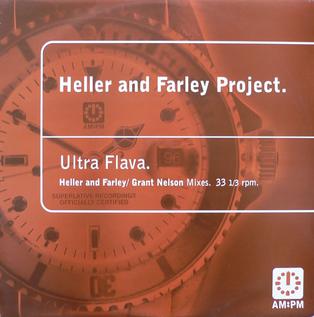
"Ultra Flava" is a house song by British duo Heller and Farley Project. After the wide renown with their remix of Ultra Naté's "How Long" in 1994 and M People's "Open Your Heart" in 1995, they released it as a single in 1996. It is a slightly re-worked version of their mix of "How Long", without Naté's vocals. They entitled it "Ultra Flava" as a nod to the track's origins. It was a huge club hit and peaked at number 22 on the UK Singles Chart, while reaching number-one on the UK Dance Singles Chart. In the US, it peaked at number three on the Billboard Hot Dance Music/Club Play chart. A black-and-white music video was also produced to promote the single.

"Calling Your Name" is a song by Swedish musician Bo Martin Erik Erikson, known under the pseudonym of E-Type. It features backing vocals by singers Nana Hedin and Jessica Folcker, and is produced by E-Type and Kristian Lundin. Released in 1996 by Stockholm Records as the second single from the musician's second album, The Explorer (1996), it was a hit in several countries, particularly in Sweden where it reached number four. The song stayed on the Swedish chart for 8 weeks, from 23 November to 25 January. In the UK, it was the first single release by E-Type reaching the top ten in the club charts. In the US, the music video of the song aired on MTV and it peaked at number 17 on the Billboard Hot Dance Club Play chart. The video featured Swedish actor Per Oscarsson, who plays a priest.

"Baby Boy" is a song recorded by Danish Eurodance act and sisters Me & My, released in December 1995 by EMI as the second single from the act's eponymous album (1995). Co-written by the Georgi sisters, the song enjoyed moderate success in many European countries, reaching number-one in both Denmark and Hungary. Additionally, it peaked at number three in Finland, number 10 in Belgium and number 30 in Austria. On the Eurochart Hot 100, the song reached number 60 in March 1996. The accompanying music video for "Baby Boy" was directed by Danish artist Peter Ravn. It featured Me & My dressed like cats, rabbits and nuns. Pan-European magazine Music & Media described the song as "equally up-tempo and infectious" as "Dub-I-Dub". In 2007, the song was included on the act's best of album The Ultimate Collection.

"This Time I'm Free" is a song by Sweden-based musician and producer Dr. Alban, released in 1995 as the first single from his fourth studio album, Born in Africa (1996). It features vocals by singer Martina Edoff and charted in many European countries, peaking at number two in Finland, number three in Sweden, number ten in Denmark and number eleven in Norway. On the Eurochart Hot 100, it reached number 22 in September 1995.

"Hallelujah Day" is a song by Sweden-based musician and producer Dr. Alban, released in 1996 by BMG and Dr. Records as the third single from Alban's fourth studio album, Born in Africa (1996). The song is co-written by Alban and produced by Peo Häggström, Per Adebratt and Tommy Ekman. It was a top 20 hit in Finland (12), a top 30 hit in Sweden (30) and a top 40 hit in Austria (35). The accompanying music video for "Hallelujah Day" was directed by Joakim Sandström.

"(Sing Shi-Wo-Wo) Stop the Pollution" is a 1991 song by Sweden-based musician and producer Dr Alban, released as the fourth and last single from his debut album, Hello Afrika (1990). It was a moderate hit in Europe, peaking at number two in Greece and number three in Finland. Additionally, it was a top 20 hit in both Switzerland and Austria. Denniz Pop co-wrote and produced it. A music video was also produced to promote the single.




















